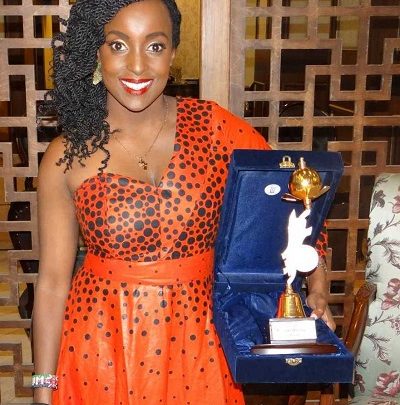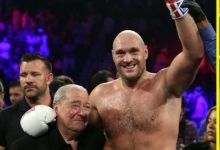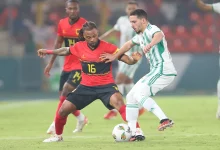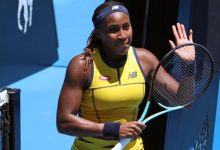
Somewhere in Korogocho, one of the largest slums in Nairobi, from a fertile ground that holds so much promise for its poor inhabitants; a football pitch, Idah Kamau Waringa, one of Kenya’s finest young sports journalists, is seen and heard, narrating the inspiring story of Acakoro, a football academy that offers a bright future in a settlement where people scavenge on rubbish dumps. “Acakoro” is a combination of two words “Academy” and “Korogocho.”
The compelling documentary has earned Waringa several accolades, with the latest coming from the Egyptian government. On November 11 in Cairo, the “Excellence Award for Young African Journalists in Sports” was bestowed on the charming TV personality by Ashraf Sobhy, the Egyptian Minister of Youth and Sports.
With her short film Acakoro: From Grass to Grace, Waringa was Africa’s runner-up in the Video Documentary category of the first edition of the AIPS Sports Media Awards. In August 2019, the NTV Kenya sports journalist, who describes herself as “passionate, driven and always up for a challenge”, took part in the AIPS Young Reporters Programme organized during the 12th African Games in Rabat, Morocco.
From interviewing prominent sports personalities to hosting glamorous sports events, Waringa has over six years developed into one of her country’s most popular sports journalists.
AIPS:How did you react to being picked for the Excellence Award for Young African Journalists in Sports in Egypt?
WARINGA: I was grateful to be recognized on a continental platform.
AIPS:How much does this recognition mean to you?
WARINGA: It means a lot. It’s my first continental award it spurs me to do better. I hope that it can also be an encouragement to others.
AIPS: Tell us a bit about the video that won you the award, AcaKoro?
WARINGA: It’s a 9 and a half minute mini-documentary on a youth team from Korogocho slum in Kenya that defied all odds to beat European football giants Barcelona and Atletico Madrid in one of Europe’s top youth competitions.
AIPS:When did you start sports journalism and why did you choose this career path?
WARINGA: I’m now 6 years in this. I started part-time in radio before moving on to TV.
Why I chose it? Always loved sports. Took part in my fair share in school. Swimming and athletics were some of my favorites. I always point to watching Candy Reid presenting CNN Sport as the moment I knew what I wanted to do with my career. She was so good. I was a kid, didn’t even know what a career was to be honest, but definitely knew that I wanted to do what she was doing. Representation matters, seeing a woman doing it inspires other women.
I also love finding out about stuff, even outside my field. People close to me always rile me up about knowing the weirdest of things. I’ve always been a curious soul and a huge part of this job is about studying, learning and reading … so it’s right up my ally.
AIPS: What has been your greatest satisfaction so far?
WARINGA: Personally, helping someone in need gives a different level of fulfillment. What we do for ourselves dies with us but what we do for others remains. Professionally, definitely getting to tell African sports stories in the African way gives me great satisfaction.
AIPS:What do you like the most about your job?
WARINGA: I have a platform to express my thoughts and creativity. Nothing like it. I always say that I’m a reporter first and anchor second. I love telling stories, love getting my hands dirty, love thinking of a concept – going out to make it happen and finally seeing the end product. The glam part of the job is definitely secondary for me. I have one of the least boring jobs in the world. I promise you. Meeting different people, different places etc.
When you get paid to do what you’d still do even without the money…then you’ve got the recipe.
AIPS:What lessons did you learn (and from whom) that are worth sharing?
WARINGA: Wow, this one is heavy. We are all the cumulation of so many people you know. If I have to name a few then; my parents taught me the power of God, reading, organisation and self-belief. Growing up, they always encouraged confidence. ‘Speak up, firm handshake and look them in the eye’ sort of upbringing. I was never taught to be shy or peripheral because “I was a girl.” Got me into trouble sometimes but hey, comes with the territory.
Carol Radull, one of the most influential sports journalists in Africa, saw something in me and gave me a chance to start out. I always keep an open heart for those coming up and in need of help because of her.
Warothe Kiru, my editor at NTV Kenya, really pushes me to embrace my full potential. Whooh, it’s like he knows another realm of elastic limits that I am yet to comprehend. And each time I have come out better because of it. We are limitless.
Evelyn Watta, AIPS VP, has helped not only me, but so many young journalists coming up. Her story is inspirational and she has shown me the power of women helping women.
AIPS:What is the best coverage you have done, that has left a lasting impression in your career?
WARINGA: Definitely the All Africa Games (African Games 2019) in Morocco.
AIPS: Having been a beneficiary of the AIPS Young Reporters Programme, could you tell us what it’s like being an AIPS Young Reporter?
WARINGA: Gruelling yet tremendously fulfilling. You see what it takes to succeed on the international front. I was delivering on multiple platforms which meant little to no sleep sometimes, but it was more than worth it. We had a fantastic mentor in Riccardo Romani who helped us discover elements of ourselves that we might not even have known were there. We grew.
The AIPS took care of all our needs so that we could focus solely on the work. Definitely one of the best experiences of my career so far.
AIPS:What are some of the lessons you learned from the programme?
WARINGA: Growth can only happen outside of your comfort zone.
AIPS: What is your opinion about the AIPS Sport Media Awards?
WARINGA: Necessary and timely. The awards are motivating many to angle and package their stories better. I have personally been witness to that in Kenya. While it’s amazing to cover the athletes’ awards, it’s also important for the press to celebrate and honour each other.
AIPS:How can a prize like this help to the future generation of sports journalists?
WARINGA: Well, it’s a legacy you know. It’s no small feat being recognized on such a platform. The AIPS is an established institution of incredible repute. I was honoured to come in as first runner-up in Africa in the Video Documentary category in 2018 and it was a great push for my career.
AIPS:From your experiences, what piece of advice do you have for a fellow young reporter?
WARINGA: Have someone more experienced than you, someone that you can exchange thoughts with. Train yourself to take constructive criticism positively, despite the initial sting. Be okay with some people not liking you.
Be curious. Be disciplined. Be driven. Don’t give up, no matter what. Fall 10 times, get up 11. It’s never about the fall, but it’s always about the recovery. Not every day will be sunshine and roses, granted … you’ll have a lot of bad days, but when you do what you love, your passion gets you through the rough times. – AIPS Media




